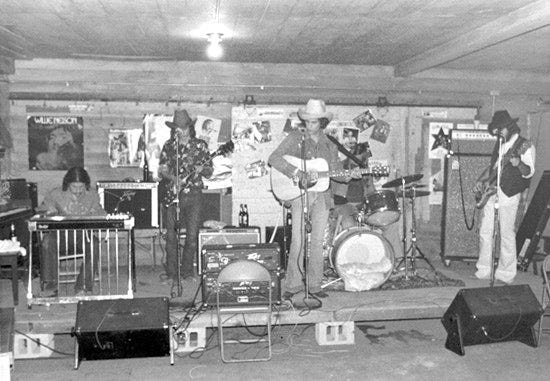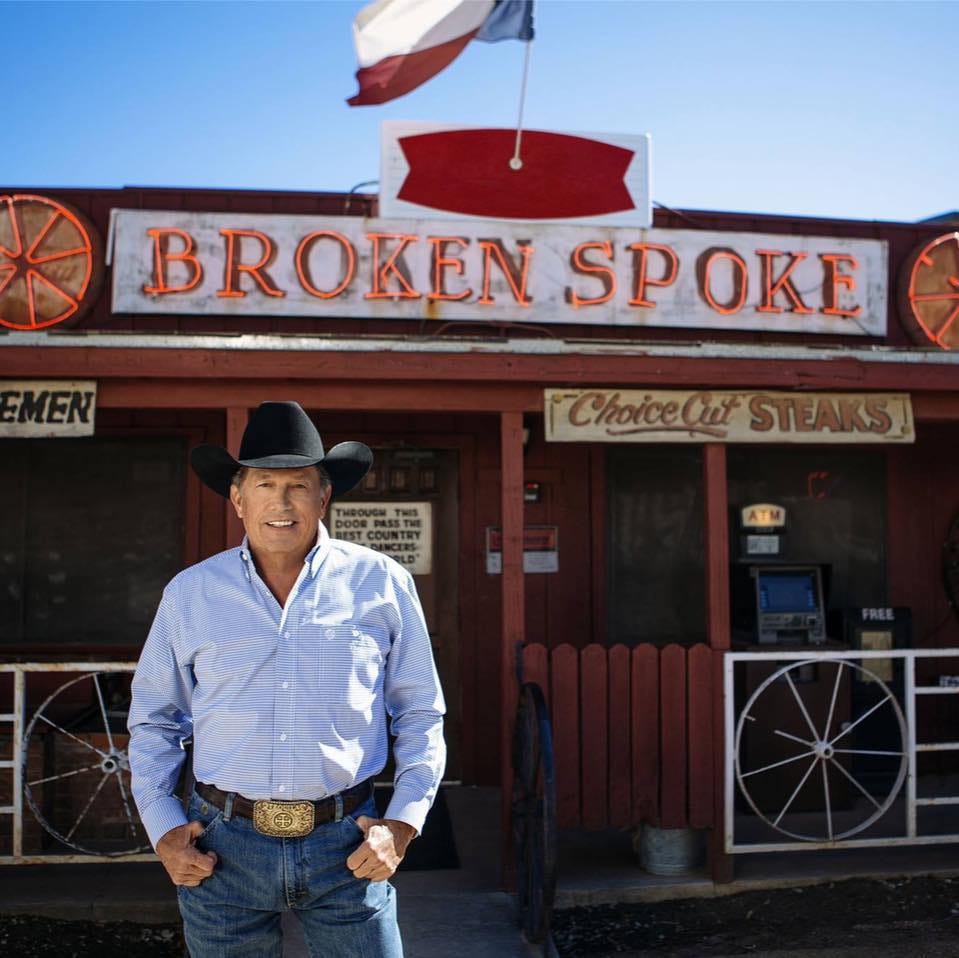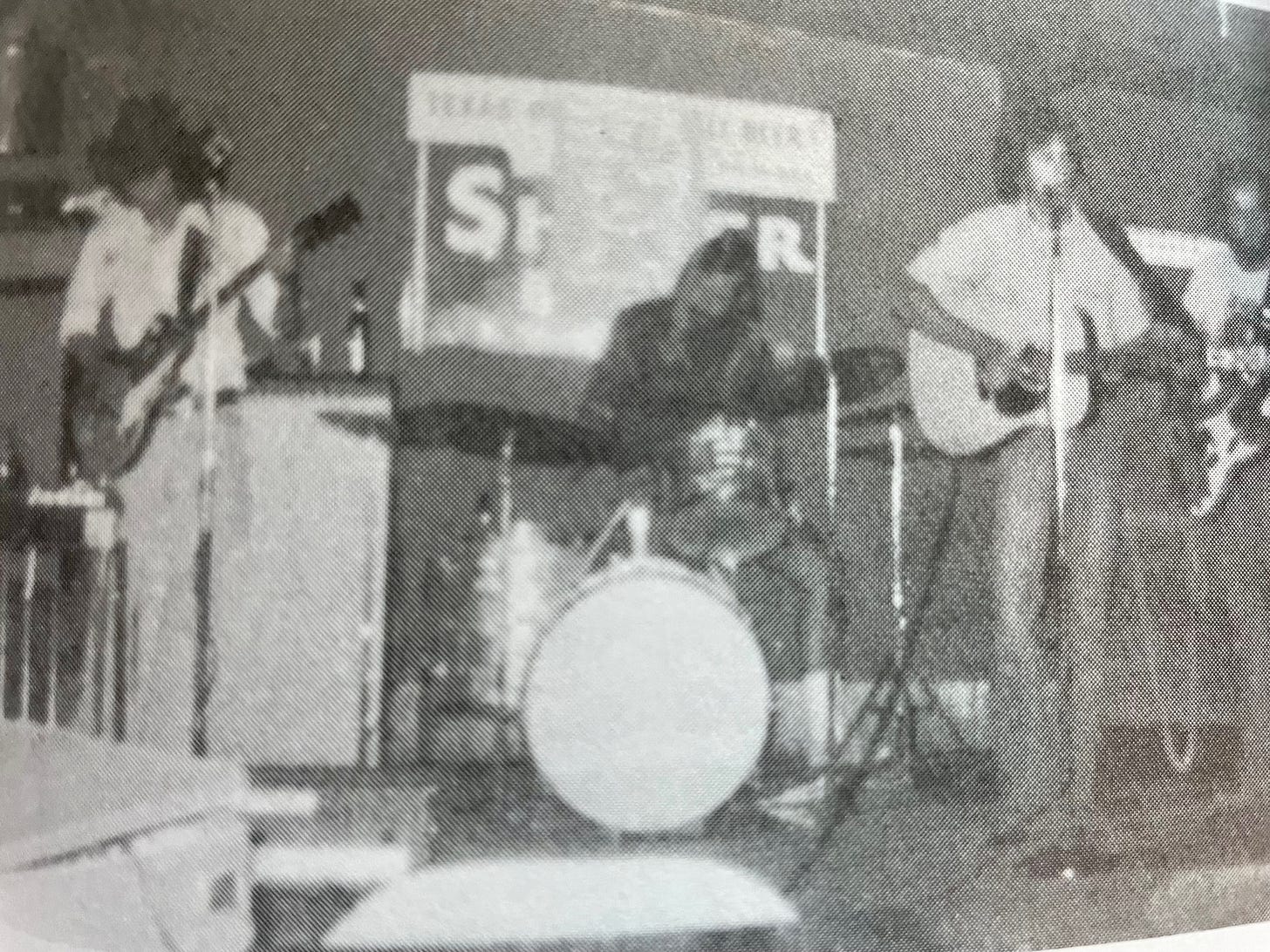
“Country band looking for singer” it said, with a phone number. From that seed of torn paper stuck on the cluttered bulletin board at the Southwest Texas State University student center in August 1975 grew a major chapter in country music history.
The first person to answer the ad, placed by three SWTS (now Texas State) students who had just left the band Stoney Ridge in a split from singer Jay Dominguez, was an agriculture major just back from a hitch in the Army.
“I remember that audition like it was yesterday,” steel guitarist Mike Daily said of the day George Strait walked into his life. “George sang two lines (of “Fraulein”) and it was over.”
Forty-eight years later, Strait, 71, is an unprecedented country music success story, with 60 No. 1 Billboard singles, more than any other act of any genre by a long shot. And Daily and original bassist Terry Hale are still in Strait’s aptly named Ace in the Hole Band, regarded in the industry as the best road group in country music, until Strait stopped touring in 2014.
“Some acts have a lot of rules for the band, but we have only one: Be on time,” said Tom Foote, who played drums for the Ace in the Hole Band from January 1976 until he switched to tour manager in 1983. “George wants to concentrate on his singing, so he surrounds himself with professionals.” I guess that’s why he wears his guitar like a medallion/ arm rest. It’s all about the voice.
Directed by Austin-based keyboardist Ronnie Huckaby, the Ace in the Hole Band today is an 11-piece marvel of musicianship, with the ability to play both Western swing and lush country ballads. But in the beginning, it was more of a bar band, with Daily, Hale, Foote and lead guitarist Ron Cabal (who died in a 1996 hit-and-run accident) backing Pearsall native Strait on not only the usual country covers, but something by the Beatles- the singer’s first musical love- and an encore of Them’s “Gloria.” You survive as a working honky tonk musician in Texas by playing something for everyone.
The 1978 addition of fiddler Bill Mabry, from Asleep At the Wheel, gave the band much-needed finesse and authenticity. And a friendship with Clay Blaker, whose Texas Honky Tonk Band was big in Houston, gave George a favorite new songwriter. Blaker wrote “Lonesome Rodeo Cowboy,” which became the title track of the first Ace In the Hole LP, celebrated with a record release party at Inner Sanctum in ‘78. The band had also put out a couple singles on the D Records imprint, but that was just a favor to label owner Pappy Daily’s grandson Mike. The label, which released singles by Willie Nelson in the late ‘50s, had been closed for over 10 years.
The group was billed “The Ace in the Hole Band with George Strait,” for it’s first five years, but as the frontman’s good looks, charisma and pure country voice made him a star, the billing was simplified to “George Strait” when he signed to MCA. But you’ll hear no complaints from the band, which released a lone album under its name in 1995.
“We didn’t even know what success was in the music business or how to get it,” Foote said of the group’s early years. “But the first time I heard George sing, I thought, ‘Well, this my chance to find out.’ “
Ace in the Hole struggled in the early years, playing Texas dives, dance halls and the annual San Marcos Chilympiad. Foote’s uncle, writer Horton Foote, modeled the upstart band in his Oscar-winning script for 1983’s Tender Mercies, in part, on the band’s scufflin’ days. The writer took actor Robert Duval, who portrayed a former C&W star at a crossroads, to meet the band when they played the Lone Star Cafe in NY. Ten years later, Strait would play the country singer who’d lost his way in Pure Country, a role that knocked him into the upper deck. The soundtrack to that 1992 film remains Strait’s best-selling album.

The first public set by the Ace in the Hole Band was at the Split Rail Inn on a Sunday afternoon in early October 1975, but that was more an audition, with payment in chicken fried steaks and beer. The band’s official debut was at San Marcos’ ramshackle Cheatham Street Warehouse on Oct. 13, 1975. First song: Ronnie Milsap’s “Daydreams About Night Things.” A year later, they were regularly packing Gruene Hall and the Crystal Palace in New Braunfels. But breaking into the Austin market was a challenge. The “outlaw country” movement was the rage in the ’70s, but even as major labels were signing just about every singing hippie in a straw cowboy hat from Texas, Strait refused to modify his traditional country style. His guys were Merle Haggard and Bob Wills.
“Finally, James White gave us a shot at the Broken Spoke,” said Daily, and we started building up a following.”
Foote recalled that Spoke debut, opening for Alvin Crow and the Pleasant Valley Boys. “We got everybody from Cheatham Street to cheer us on, so Mr. White would think we were a big draw,” he said. White booked the band once a month for five years at $400 to $500 a gig.
Unlike his bandmates, Strait was married and had a young child to support when he joined the band. Growing up, he loved working on his family’s ranch near Big Wells, so Strait had a tough decision to make when he graduated from college in 1977 and was offered a job selling farm equipment in Uvalde.
“He had the ambition to be what he is now,” Daily said, “so he decided to give the music business one more shot.”
In the summer of ’77, Cheatham Street Warehouse owner Kent Finlay, songwriter Daryl Staedtler and Strait drove a two-seat cargo van from San Marcos to Nashville, Tenn., taking turns sleeping on the Army cot in the back.
“George really needed a record deal,” Finlay said, “so we loaded up 10 cases of Coors beer and brought a six-pack to each label. You couldn’t get Coors in Nashville back then, so it made it easier to get a foot in the door.” Though not much came of the trip, Strait recorded Staedtler’s “A Fire I Can’t Put out” on his second album and had his second No. 1 hit.
Ironically, Strait got his big break in San Marcos, when the band played at Erv Woolsey’s Prairie Rose nightclub in the late ’70s. After about a year of running the club, Houston native Woolsey returned to his job at MCA Nashville, where he persuaded the other execs to sign the singer from San Marcos. Woolsey eventually quit his label job to manage Strait, who didn’t need a publicist because he didn’t do interviews. He barely says a word onstage either. He realized early on that the music talks better than he does.
Strait’s debut MCA single, “Unwound,” reached the top 10 in 1981. The first No. 1 hit came the next year with “Fool Hearted Memory,” as did the signature song “Amarillo By Morning.” Strait had at least one No. 1 single the next 30-plus years. In 2006, Strait was inducted into the Country Music Hall of Fame, and he’s the only member still recording No. 1 hits.
The Ace in the Hole Band rarely played on Strait’s albums (1987’s Ocean Front Property an exception), as his Nashville-based producer Tony Brown preferred to work with session players. But live is where the musicians, whose training ranges from honky-tonk taught to fiddler Gene Elders’ classical background, find room to shine. Like Willie Nelson’s Family, formed just a couple of years before the Ace in the Hole Band, there is an almost telepathic connection among the players.
Many of the San Marcos haunts of the band’s early years, including the Cheyenne Social Club (formerly the Getaway), the house on Uhland Street where Strait auditioned, and George and Norma Strait’s house, directly across Riverside Drive from Herbert’s Taco Hut, have been torn down. But the band born from such humble beginnings has kept its musical passion alive.
They played themselves in Pure Country, with Strait as Dusty, a fame-warped country singer, leaning on garish special effects. Eventually he returns to his traditional country roots. But Strait’s real career path has never been anything but simple and steady.
“If I had to use just one word to describe George Strait, it’s ‘authentic,’ ” said Foote. “There’s nothing contrived about him. When the label folks wanted George to move to Nashville, he stayed in Texas because that was home.”
There was also pressure from Nashville for Strait to replace the Ace in the Hole Band with more seasoned Nashville players. The former members of Stoney Ridge were a little rough in the beginning. “George resisted, giving everyone the chance to grow into their position,” Foote said. Besides, where was he going to find another band that shared his obsession with All My Children? In the years before VCRs, you had to watch soap operas live, and after the van’s small TV was stolen one night, George and the band hunkered around a display TV in Sears the next day to follow the drama in Pine Valley. That anecdote was from A Honky Tonk Odyssey: My Eight Years with George Strait by original guitarist Cabal.

There they were, the band born on a bulletin board in San Marcos, headlining the first night of the 2021 Austin City Limits Music Festival in front of 40,000 fans. Most of them weren’t born when “Amarillo By Morning” first came out of car speakers in 1982, but they sang along to every word. It’s pure Texas in a song. Strait took the band back to its roadhouse days when the set ended with a rocker- “You Wreck Me” by Tom Petty. New drummer Bobby Jarzombek of San Antonio had little trouble producing a hard rock beat- he’s a heavy metal veteran whose resume includes Rob Halford, Riot and Fate’s Warning. He replaced longtime drummer Mike Kennedy, who died in a 2018 car accident in Tennessee, first in the Texas Jamm Band and then Ace in the Hole.
Strait and the Aces play only special, one-off shows these days, like the 2022 grand opening of the Moody Center with Willie Nelson on April 29-30, Willie’s two birthdays. Don’t be surprised if they all get together in October ‘25 for a memorable 50th anniversary. Missing, besides Cabal and Kennedy, will be club owners Kent Finlay and James White, who got these San Marcos college kids started on their humble road to glory. Strait put the Broken Spoke on the cover of his most recent No. 1 album Honky Tonk Time Machine, while Cheatham Street has an indelible place in King George lore. If George Strait has taught us anything, it’s that country music has a strong memory.






Great piece - made my day!
Thanks for the recognition of the late Kent Finlay, the greatest advocate that Texas songwriters have ever known.